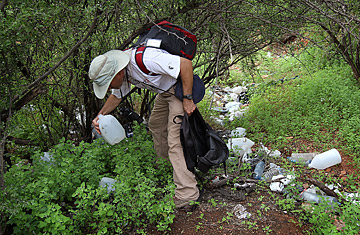
Volunteer Tim Doherty inspects an empty water jug, cast off by immigrants crossing into Arizona from Mexico, on July 31, 2010, near Green Valley, Arizona. Doherty conducts patrols for the nonprofit Samaritans, delivering water to points near the border
Daniel Millis, a volunteer with the faith-based organization No More Deaths, was arrested in 2008 for littering. His crime: leaving bottles of drinking water on trails near the Arizona-Mexico border so immigrants walking through the desert would not die of thirst.
Last week, the U.S. Court of Appeals for the Ninth Circuit overturned Millis' conviction, by a 2-1 vote. It was an important ruling. However the immigration debate works itself out, we do not want to be a country that puts humanitarians in prison for giving water to people dying of thirst.
What is disturbing, however, is how limited the court's decision was. As a result, people can still be arrested for doing exactly what Millis did.
On Feb. 22, 2008, Millis and three colleagues were driving through the Buenos Aires National Wildlife Refuge in a Toyota 4Runner. U.S. Fish and Wildlife Service officers stopped them and spotted gallon-sized bottles of water. When the officers questioned him, Millis admitted that he and his friends had been placing plastic bottles of water along the refuge's trails, adding that they were picking up discarded water bottles as well. Millis was doing his work as a volunteer for the group No More Deaths, a ministry of the Unitarian Universalist Church of Tucson.
One of the officers told Millis that leaving water without a permit was littering. The government says that leaving water bottles not only clutters the refuge, but poses a danger to wildlife. The officer told Millis that if he sought a permit, he would be denied one. (Another organization had been given a permit to place water on the land.)
Millis was given a citation for "disposal of waste" on a national wildlife refuge. When asked by the officer, Millis handed over the GPS coordinates of every location where the group had left water that day. The officers later retrieved 17 bottles of water that had been left along the trails.
At his trial, Millis admitted he had left water for illegal immigrants to find on their travels, but he insisted that he had not broken the law. "Humanitarian aid," he contended, "is never a crime." The magistrate judge disagreed, however, finding Millis guilty and giving him a suspended sentence. On appeal, a federal district court judge affirmed the conviction. Millis appealed again.
For the San Francisco–based U.S. Court of Appeals for the Ninth Circuit — which covers Arizona, California and seven other Western states — it came down to a matter of definitions. Millis was not charged with littering per se. He was accused of disposing of "garbage, refuse sewage, sludge, earth, rocks, and other debris" in a national wildlife refuge. The government claimed that the water bottles Millis left behind for the immigrants were "garbage."
The appeals court disagreed. The court concluded that the water bottles Millis left behind did not meet the common meaning of the word garbage, especially given that courts are inclined to interpret ambiguous criminal laws against the government. (Judge Jay Bybee, who is best known for writing a legal memo when he served in the George W. Bush Justice Department that green-lighted the use of torture, dissented. He would have upheld Millis' conviction.) The troubling part of the decision is that Millis might well have been convicted if he had just been charged under a different part of the law.
The same federal statute that prohibits disposing of garbage in a national refuge also makes it illegal to abandon property there, or to place certain property in a refuge without a permit. While reversing Millis' conviction for disposing of garbage, the Ninth Circuit emphasized that he might well have been charged under one of these other provisions. In other words, although Millis is in the clear, the next person to leave water bottles where he did risks going to jail.
The risk of death to immigrants caught in the desert without water is real. Some groups put up signs warning immigrants of the danger, but in many cases the migrants go ahead. There are water stations along the border, but not enough. According to No More Deaths, at least 214 human remains have been found so far this year in the south Arizona desert alone, putting 2010 on track to be the deadliest year yet. Two days before Millis was stopped, the group says, he had found the body of a 14-year-old girl from El Salvador.
No More Deaths works with another Tucson-based group called Samaritans to leave life-saving supplies in the desert. The word Samaritan is often used metaphorically, but in this case the word is a literal fit. In the biblical parable, Jesus told of the Samaritan who went to the aid of a traveler who was left for dead by the side of a road. Jesus then told his followers, "Go and do likewise." But you need not be Christian, or religious at all, to know that what Millis did was fundamentally right and moral — and that it should not be against the law.
This issue is likely to show up in court again before long because humanitarians will keep leaving water, and the government seems intent on saying that doing so is illegal. Before it does, Congress should add an exception to the law — and make clear that leaving supplies on public land in a reasonable way, in a good-faith effort to save lives, is not a crime.
